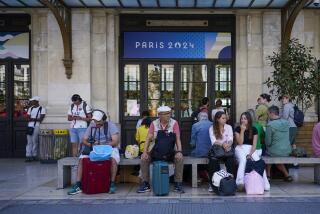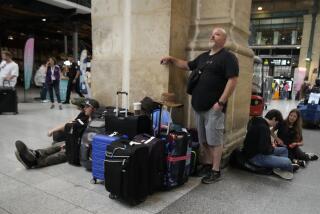1 Killed, 20 Injured as Bombs Explode on 5 Trains in India
- Share via
NEW DELHI — Bombs rocked five express trains racing across India on Monday, killing one passenger and injuring at least 20 others as the country warily marked the first year since the destruction of a mosque by a swarm of Hindu militants.
There was no immediate claim of responsibility for the attacks, but authorities had been bracing for violence linked to the anniversary of the razing of Babri Masjid, a 16th-Century mosque, in the north Indian town of Ayodhya on Dec. 6, 1992.
“The planting of these devices on selected prestigious trains seems to indicate a design to create a scare among the public,” Railway Minister C. K. Jaffer Sharief told Parliament. Another lawmaker, Somnath Chatterji, called the explosions a reminder of the “shame” India had to undergo one year ago when it was hit by the bloodiest Hindu-Muslim rioting in half a century.
A 60-year-old man was killed when a bomb, apparently hidden in the suitcase he was sitting on, tore open a crater in a second-class coach of the New Delhi-bound Andhra Pradesh Super Express 20 minutes after it left the southern city of Hyderabad.
An explosion before midnight on an air-conditioned express train linking New Delhi to Calcutta injured two waiters. The Flying Ranee Express between Surat and Bombay, India’s financial and business center, was rocked by a blast in a double-decker, second-class coach; one person was injured.
A train crossing the desert state of Rajasthan in west India on its way from Bombay to New Delhi was hit by a blast that injured four people. A bomb exploded in another express bound from Calcutta to New Delhi, and authorities found a second bomb and removed it.
Indian Muslim religious leaders called a one-day general strike in cities across India to mourn the destruction of their house of worship, while Hindus planned a rally near the rubble of the Ayodhya mosque.
Though there was some unrest Monday, it was on a much more modest scale than the outburst of vicious hatred unleashed one year earlier by the demolition of the mosque, which Hindu militants wanted to replace with a temple to their god Ram. Up to 2,000 people, mostly Muslims, died in the rioting and terrorist bombings that ensued.
In the southern Indian state of Andhra Pradesh, home to a large Muslim community, a one-day protest strike called by Muslims was largely peaceful, and shops, hotels and businesses were closed in much of Hyderabad, the capital.
In another southern state, Karnataka, more than 1,500 people were taken into preventive custody on the eve of the anniversary. Only scattered stone-throwing was reported Monday, although in the cities of Bidar and Raichur, participation in the protest was widespread.
In Ayodhya itself, Muslims observed a “black day,” with shopkeepers closing their shutters.
In New Delhi, leaders of the organization that formulates marriage and property law for India’s 120 million Muslims met with Prime Minister P. V. Narasimha Rao to object to his “indifference, insensitivity and inaction” in getting the Ayodhya mosque rebuilt.
More to Read
Sign up for Essential California
The most important California stories and recommendations in your inbox every morning.
You may occasionally receive promotional content from the Los Angeles Times.










